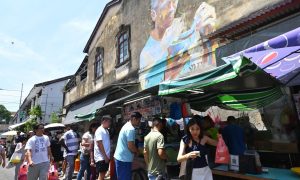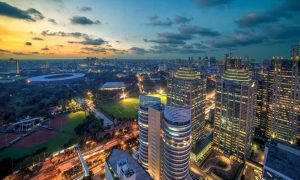With globalization, more and more families are choosing toimmigrantsto the vibrant Southeast Asian country of Indonesia. Not only does Indonesia offer unique natural beauty and a rich cultural background, but it also offers families a wide variety of educational options, healthcare services, and suitable living conditions. This article will analyze in detailFamily Migration to IndonesiaWe will help you make an informed immigration decision by providing you with the best education, healthcare and living environment in the world.
i. indonesia's education system
1. Overview of the education system
The Indonesian education system is divided into the following stages:
- Early childhood education (3-6 years): Includes pre-schools and kindergartens.
- Basic education (6-15 years): It is divided into elementary school (6 years) and junior high school (3 years), which are the compulsory stages of education.
- Secondary education (16-18 years):: Includes general and vocational high schools.
- higher education: Offers a choice of universities and vocational training schools.
Public schools in Indonesia are inexpensive, but instruction is mainly in Indonesian. If you want your child to receive an international education, an international school is a better choice.
2. International schools
Indonesia is home to many excellent international schools, especially in the cities of Jakarta, Bali and Surabaya. Common international programs include:
- IB (International Baccalaureate)
- IGCSE and A-Level (Cambridge Curriculum)
- AP (American Pre-College Program)
Tuition Fee Reference: Tuition at international schools ranges from $5,000 to $30,000 per year, depending on the school's reputation and curriculum.
II. Medical conditions and services
1. Indonesia's healthcare system
Indonesia's healthcare system consists of public and private healthcare:
- public health care: Services are inexpensive, but facilities and resources are limited and suitable for primary health care needs.
- private medical care: Modern facilities, high quality of service, relatively high prices for foreign immigrant families.
The Indonesian government has introduced a universal healthcare system (BPJS) that covers basic medical needs, but foreigners are required to have a work visa or long-term residence permit to join.
2. Recommended hospitals
- Jakarta International Hospital (JIH)
- Siloam Hospitals(Chain of hospitals, widely distributed)
- BIMC Hospital (Bali)
These hospitals offer high-quality services and the doctors can usually communicate in English.
3. Medical insurance recommendations
Foreign migrant families should take out private health insurance to ensure that they have access to the best medical care in case of emergency. International insurance companies such as Allianz, Cigna, etc. offer comprehensive coverage medical insurance plans in Indonesia.
III. Living conditions
1. Rental versus purchase options
Indonesia's real estate market offers a diverse range of options, from high-end condominiums to single-family homes.
- Jakarta: Ideal for families seeking urban convenience, recommended areas include Pondok Indah and Kuningan in South Jakarta.
- Bali: Ideal for families who enjoy a quiet life, popular areas include Canggu and Ubud.
- Surabaya and Bandung: Suitable for families with limited budgets who still want access to quality education and healthcare.
Price Reference::
- Apartment rent: $500-2000/month
- Detached house: $1000-4000/month
- Purchase price: about 500-3000 USD per square meter, depending on the area.
2. Infrastructure and security
- infrastructure: Jakarta and Bali have better infrastructure, including good transportation, supermarkets, shopping centers and recreational facilities.
- Community safety: Many residential areas are equipped with 24-hour security and are suitable for families.
IV. Ease of family life
1. Cultural integration and language
Indonesians are known for their friendliness and tolerance, and immigrant families usually adapt quickly to local life. However, in order to better integrate, it is helpful to learn basic Bahasa Indonesia (Indonesian).

2. Food and shopping
Food in Indonesia is inexpensive and varied, ranging from local delicacies such as satay and rice packages to international foods offered in Western-style restaurants and supermarkets catering to the needs of foreign families.
3. Mode of transportation
- private car: Ideal for daily family commuting, transportation can be solved by leasing or purchasing.
- online taxi: Apps like Grab and Gojek are very popular and convenient.
- mass transit: For example, the Jakarta Metro (MRT) and bus system is more developed for daily commuting.
Five,Indonesia ImmigrationChallenges and responses of the family
1. Climate adaptation
Indonesia's tropical climate can be troublesome for first-time migrant families, and precautions against heat and mosquitoes are recommended.

2. Higher costs of education and health care
The cost of international schools and private healthcare can put a strain on budgets, and it is advisable to make a detailed financial plan before emigrating and to take full advantage of insurance coverage.
3. Changes in laws and visa policies
Indonesia's immigration policies may be adjusted at any time, and it is recommended to work with a professional immigration agency to ensure a smooth process.
VI. Summary
householdImmigration to IndonesiaIt is an option worth exploring, with its diverse education system, reliable healthcare and suitable living environment making Indonesia a popular destination for immigrants in Southeast Asia. However, it is important to understand all aspects of education, healthcare and housing, to plan your finances and to adapt to cultural differences in advance in order to create a more comfortable move for your family.
Whether it's for the future of your children or the pursuit of a better quality of life.Immigration to IndonesiaAll may be the ideal place for you to start a new chapter.






